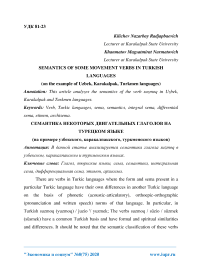Semantics of some movement verbs in Turkish languages (on the example of Uzbek, Karakalpak, Turkmen languages)
Автор: Kilichev N.R., Khanmatov M.N.
Журнал: Экономика и социум @ekonomika-socium
Рубрика: Основной раздел
Статья в выпуске: 8 (75), 2020 года.
Бесплатный доступ
This article analyzes the semantics of the verb suzmoq in Uzbek, Karakalpak and Turkmen languages.
Verb, turkic languages, sema, semantics, integral sema, differential sema, etimon, archisema
Короткий адрес: https://sciup.org/140252944
IDR: 140252944 | УДК: 81-23
Текст научной статьи Semantics of some movement verbs in Turkish languages (on the example of Uzbek, Karakalpak, Turkmen languages)
There are verbs in Turkic languages where the form and sema present in a particular Turkic language have their own differences in another Turkic language on the basis of phonetic (acoustic-articulatory), orthoepic-orthographic (pronunciation and written speech) norms of that language. In particular, in Turkish suzmoq (yuzmoq) / juzio '/ yuzmek; The verbs suzmoq / süzio / süzmek (süsmek) have a common Turkish basis and have formal and spiritual similarities and differences. It should be noted that the semantic classification of these verbs also poses some difficulties, as these verbs belong to a separate LMG with specific meanings, even though the lexical-thematic groups are grouped together in the same group in all Turkic languages with basic meanings, as well as some semantics in other forms (verbs). is created using This can be proved by the fact that the ancient periods of the Turkic languages have been characterized by separate dialects since the time when Turkic dialects were differentiated. This process occurs not only in verb phrases, but also in semantics of words such as noun, adjective, adverb. This process became the basis for the emergence of meanings of action, situation, process, speech with different verbs in each language, especially in connection with the development of verb semantics. For example, in Uzbek, Karakalpak, and Turkmen languages, such semantics as hair removal, shaving, and trimming are given in different spiritual contexts: shaving (shaving), shaving (shaving), shaving (Turkish). ) as.
Uzbek, Karakalpak, Turkmen languages belonging to the Qarluq, Kipchak, Oghuz groups of Turkic languages suzmoq (yuzmoq) / juzio '/ yuzmek; The verbs suzmoq / süzio' / süzmek (süsmek) form a formative relation. More precisely, in Uzbek the word suz = verb (Uzbek folk dialects also have face = phonetic variant) has several semantic relations through three different forms, in Karakalpak language these meanings are through separate verb forms juz = va suz =, and in Turkmen language they have three different meanings. It is represented by three different verbs, which differ in form and meaning, such as =, süz =, süs =. To understand the differentiation of these verbs according to their form in Turkic languages, it is necessary to consider their etymology and stages of development.In the ancient Turkic language, jüz, süz, süs are separate verbs that form expressions that differ in form and meaning. We analyze them separately on the basis of the Old Turkic dictionary.
The verb juz has two forms in the ancient Turkic language: I. 1) swim: the earth floated in water - the earth (man) swam in water; 2) migration. m. to spread II. to pluck, to pluck, to pluck: the earth has plucked - the earth has plucked the skin of a slaughtered animal [DS, 1969: 288].
The verb süz = also has two forms in the ancient Turkic language: I. 1) to swim, to purify, to clarify, to clarify: al suv suzdi - he suzdi suzdi; 2) swim with the horn. [DS, 1969: 519]. In this sense, the verbs syllable and ornament are phonetic variants, i.e. they are two variants of the same phoneme, allophonema, forming the z / s consonant-consonant relationship. In this sense, the leading form is süs =, which can be defined by the following word and other words formed by it.
In addition, just like in the Uzbek language, the word kozin comes in the form of a stable compound, which means “to look at” (Qyz gyzyn tartyp basyn, kozin suzip, kerip qasyn) [QTTS, 1992: 232].
The Turkmen verb süzmek [süzmök] does not have the same homonymous relationship as in the Uzbek and Karakalpak languages, but retains its form and meaning in the ancient Turkic language and represents the following semantics: 1) to filter the liquid to purify it 2) fishing with nets and strainers; 3) to look at the lashes close together (I said, squinting, on a standing elbow); 4) nomadic meaning. (nomadic) to drink tea, etc. slowly, without haste, with pleasure and enjoyment (Kakam, on the other hand, leans on the porch and strains the green tea) [TDDS, 2015: Volume II 301].
We know that Uzbek, Karakalpak, and Turkmen belong to the Qarluq, Kipchak, and Oghuz groups. Therefore, the integral and differential semaphores of the verb yot = can be summarized as follows:
Integral semaphores: 1) "pass through a strainer or something else and clean from various impurities"; 2) "separate the required part of the liquid".
Differential semaphores: 1) "distribution of ready meals or beverages in edible or drinkable containers"; 2) "distribution of cards to players" (eng.); 3) 3) “to stretch, stretch” (q-poq.); 3) "Drinking tea, etc. slowly, without haste, with pleasure and enjoyment" (Turkish).
In general, the study of verbs in a comparative-historical way provides a great material for Turkic studies, especially Uzbek linguistics. It clarifies the processes of semantic narrowing, meaning expansion, obsolescence and renewal in the semantics of verbs that have emerged in the historical development of Turkic languages.
Список литературы Semantics of some movement verbs in Turkish languages (on the example of Uzbek, Karakalpak, Turkmen languages)
- DS - Drevnetyurkskiy slovar. -Leningrad: Nauka, 1969. S.475.
- OTIL - Annotated dictionary of the Uzbek language. Volume 5, Volume II. -T.: State Scientific Publishing House "National Encyclopedia of Uzbekistan", 2006, P.50-51.
- QTTS - Explanatory dictionary of the Karakalpak language. Volume 4, Volume II. -Nukus: "Karakalpakstan", 1984. P.186.
- TDDS - a thoughtful dictionary of the Turkmen language. Two volumes. I tom. - Ashgabat: Science, 2016. -472 s.


